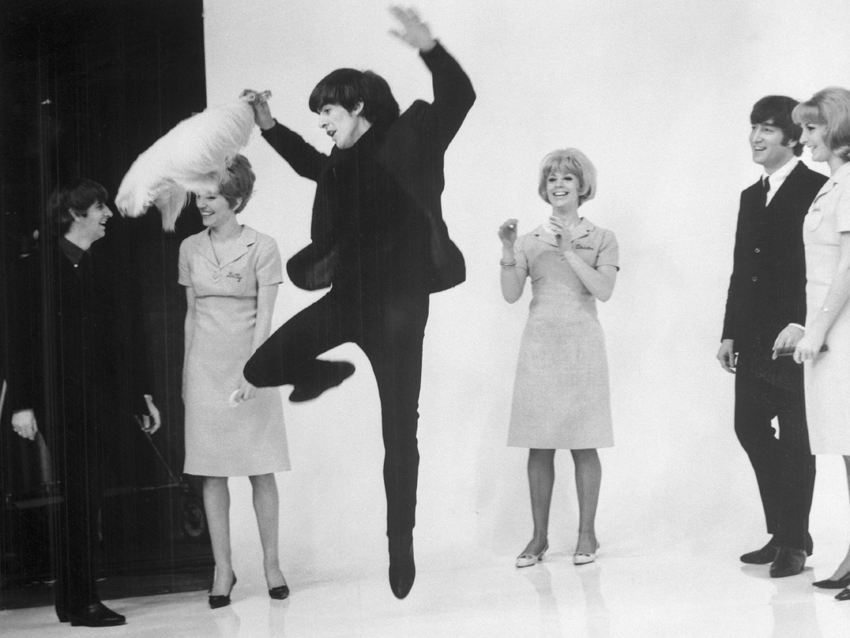
Giles Martin on remixing The Beatles' A Hard Day's Night
To mark the 50th anniversary of the release of A Hard Day's Night – the bold, madcap 1964 comedy classic that not only made heretofore Beatles naysayers fall in love with the band's undeniable charms but also launched the career of director Richard Lester, who seemed to presage the impact of music videos 17 years before MTV – Janus Films is releasing a new 4k digital restoration version of the picture to almost 100 cities in the US on July 4.
For both longtime Beatles aficionados and newbies, experiencing the film in theaters – the new print was assembled from the original 35mm camera negative and is presented in the original theatrical aspect ratio of 1.75:1 – is the way to go. But for those who can't make the trip, a Criterion Collection Director-Approved Dual-Format Blu-ray and DVD Special Edition package has already been released.
In addition to it other myriad attributes – the film is currently ranked as the number one best-reviewed movie on Rotten Tomatoes with a score of 99% – A Hard Day's Night was also a breakthrough in sound recording and editing. To preserve the true sonic representation of original presentation, while taking advantage of today's technology, Giles Martin, son of Beatles producer George Martin, spent months overseeing a knockout 192-kHz/24-bit 5.1mix.
Martin sat down with MusicRadar recently to discuss the challenges he faced mixing A Hard Day's Night for surround sound, one that involved locating tapes from various sources, some of which were thought to be long gone. "It really took a lot of effort, finding the tapes and then making everything flow seamlessly," he says. "You want to update the sound and make everything appear totally accurate and normal, but you don't want to change anything, really. It's not about trying to put a mustache on a Mona Lisa."
Giles, I would assume you saw A Hard Day's Night countless times as a kid. Is it a little different for you to watch the movie than for other people? You're obviously so close to the individuals involved.
“Yeah, that's an interesting point. The movie impacts me differently than it probably does most people. You have to approach a project like this with two heads on, so that involves being deeply emotional and incredibly cold all at the same time. It’s a bit like being a surgeon.”
“The movie was made before I was born, so I wasn’t really conscious of it growing up. The truth is, I didn’t really watch it as a kid; it was one of those films that wasn’t shown on TV a great deal. I think I saw Help! a lot more. But when I did see it, I loved it, and of course, the chance to work on it was tremendously exciting.”
When you did watch the film with your dad, did he ever say things like, ‘Oh, I wish we could have done this with the sound?’ Did he ever bring certain things to your attention?
“Well, it’s funny: He used to say that he wished they didn’t have two-track or four-track – they should just have more tracks. [Laughs] What I found out was that half of A Hard Day’s Night is two-track. He had four-track available to him, only he didn’t use it. I guess there was no point, as the band was writing these instant hits. You didn’t really think about what was going to happen in the future.
“The great thing about The Beatles, and this is hard to get across, is that they would go in and make stuff that was bursting with energy. They’d finish it and move on to something else. Everything moved at an incredible speed, but it’s a speed that must’ve felt normal to them, or at least ‘This is the way that we do it.’ They did things brilliantly by instinct and by accident."
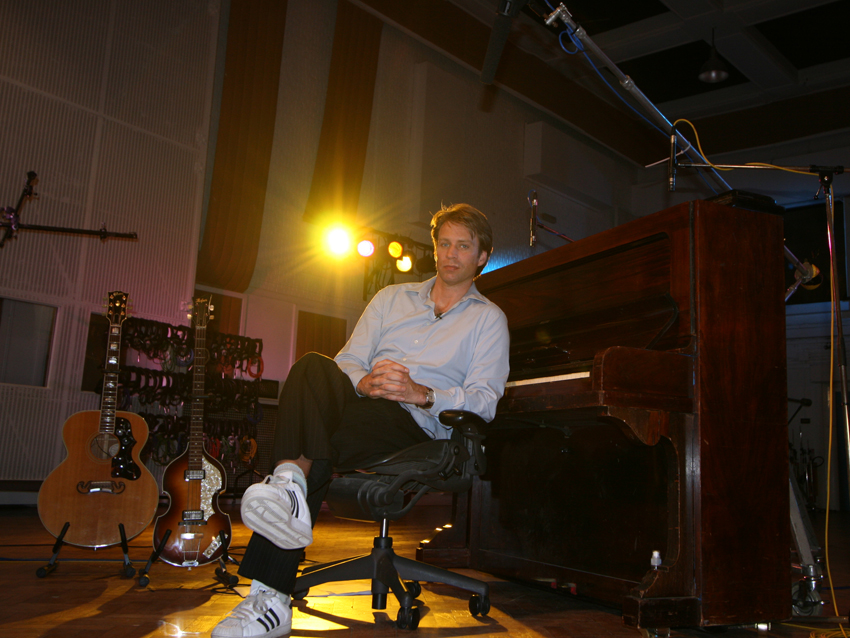
Giles Martin on remixing The Beatles' A Hard Day's Night
It is amazing to consider how quickly The Beatles and your father worked. Nowadays, bands spent two or three years on one album, and a lot of times you can’t figure out why it took so long.
“I think it’s a matter of what you’re focusing on. There’s a lot of talk about technology and The Beatles – they broke down walls and all of this. But you have to break down walls if you want to try new things, which they obviously did. With them, it was always about getting the heart and the energy across. That’s the best thing about A Hard Day’s Night – it has heart and it has energy.
“I mean, it’s not Lawrence Of Arabia. It’s a snapshot of who they were and how they were and what it was like then. Even though it’s a spoof, it does give you a bit of a view of their world back then. It’s the first long-form video as well, and as such it’s incredibly daring. I can’t think of a band that would let their lead guitarist fall flat on his face in the opening scene. [Laughs]
“So it’s more rock ‘n’ roll than you think, and it’s more obscure as well. They wrapped their edginess into a package – they wore suits, which made them come across as these respectable blokes to kids’ parents. That’s the thing about A Hard Day’s Night: It gets under your skin, no matter who you are.”
Walk me through the process of updating the sound. You used the original tapes…
“We had the original tapes from Abbey Road, yes, which was great. The hard part was finding the speech tapes and the sound effects tapes from the film, because nobody keeps those. We found different reels in different places, even in cupboards, so we had to piece those together, which took a while. It was like doing detective work.”
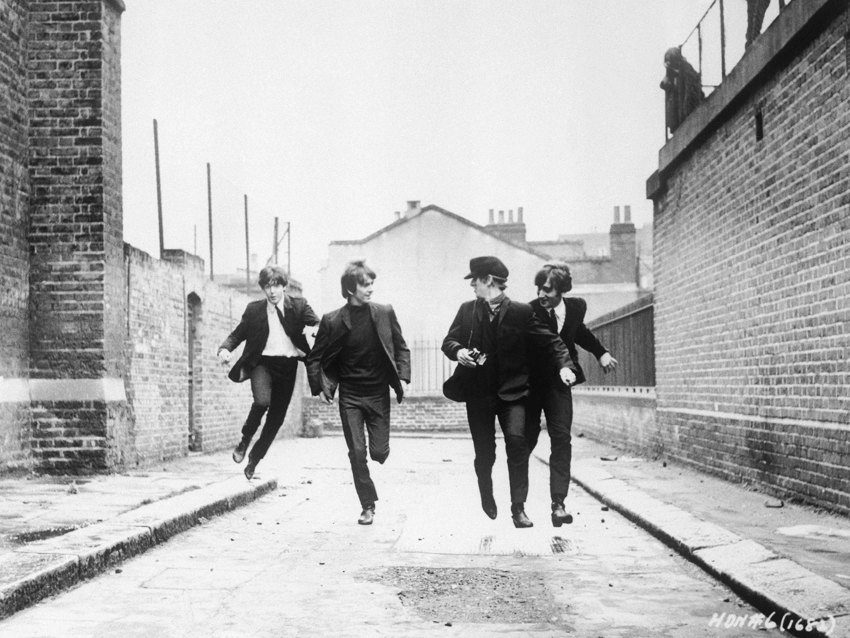
Giles Martin on remixing The Beatles' A Hard Day's Night
Were they in good shape? Did you have to bake any tapes?
“We didn’t have to bake any Beatles tapes – we got lucky. You sometimes get tapes from the ‘80s – maybe Tears For Fears or whomever – and those you do have to bake. But The Beatles’ tapes sounded great, which helped a great deal. Actually, the big problem was in trying to make the music match the speech and sound effects. You don’t want this really shiny song go into some slightly muffled speech; you need the two to meet each other and sound natural.
“Some songs were four-track and others were two-track. A Hard Day's Night and I Should’ve Known Better were four-track; I’m Happy Just To Dance With You and Tell Me Why were two-track. The very early stuff was two-track. Trying to do a 5.1 to She Loves You was hard. That song is in the live performance section, and it’s in mono. Because of that, uou have nothing to play around with; you just have everything on one track.”
What all was involved with trying to make everything sound uniform?
“The biggest thing to me was, I wanted the vocals to be in the center. It was always weird to me to watch the film with stereo speakers – the music would start and the vocals would leap to the left. That was always odd. But I quite liked the mono, so I made a mono stereo and a mono 5.1, and I sort of spread it out. Once you make that rule for yourself, you have a bunch of challenges. For instance, there’s a lot of hi-hat with the drums on A Hard Day’s Night, and it sits in with the guitars. On the original stereo, they put that to one side and the vocals to another; if you put them together, they’re all mixed in, and so that’s a challenge.
“When you approach something like this, you have to keep in mind that you’re working with music is loved by everyone. You don’t want to make it sound artificial in any way. The challenge is making it as relevant today as it was in 1964 without over-modernizing it.”
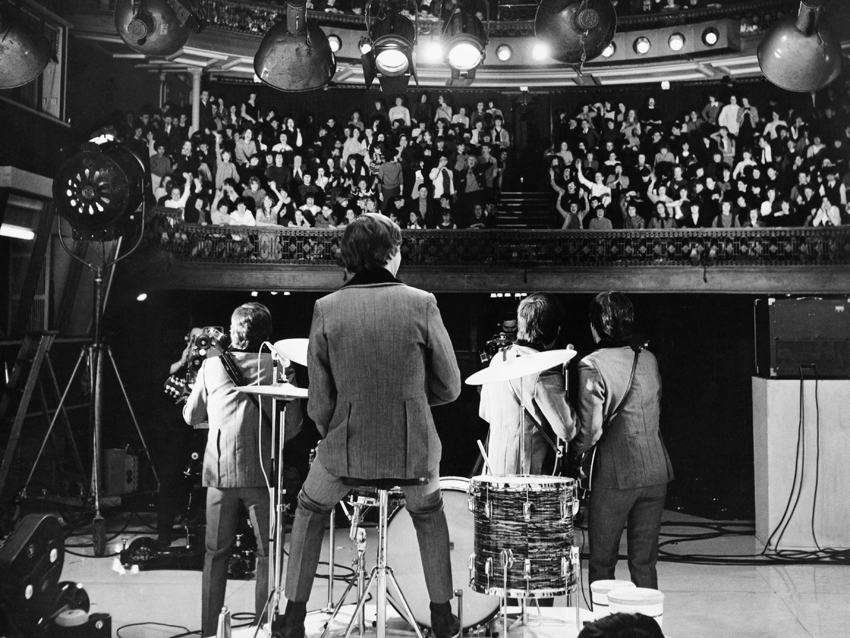
Giles Martin on remixing The Beatles' A Hard Day's Night
I read that the mixes of the songs in the film were slower than the album versions. Why was that?
“Yeah, and that’s something I asked them to change. When I was working on the Martin Scorsese-George Harrison film, I noticed it. And I Love Her was a semitone down. It’s got to do with frame rates. I asked them, 'Can you change the frame rate of the film?' and of course, you can’t because that would speed up the film. Pitching the music but keeping it at the same speed might have worked, but then you’re going into a digital world that’s kind of unpleasant. It’s a bit like plastic surgery, and you don’t want to be doing that, putting a new face on something. The thing about And I Love Her in the film is, it’s a different mix. It’s not a double-tracked vocal, whereas the original is.”
You said that you had to track down the tapes of dialogue and sound effects. Did you have any problems with those tapes once you found them?
“Oh, yeah, massive. That was a massive problem because quite often the dialogue and effects were together. We ended up sampling and looping various things, like the sound of a train, for example. On the 5.1, you hear the same train sound going around as you do the dialogue and effects. But the weird thing I found was, if I added more effects, they almost canceled the original sounds out.
“Just think, if you have George knocking over an amp, which he does in one scene, we wanted that in there – it’s more immersive. We cheated certain things. It bothered me that when the girls were shouting The Beatles’ names in the concert, you couldn’t hear them. So I got some girls to scream their names [laughs]. It’s very subtle. You wouldn’t notice it. I probably shouldn't have told you that. [Laughs]
“But this is what Paul says, and my dad says it as well: ‘You do what you can if they could do it now.’ It’s not about re-creating anybody's vision - it's preserving it. I didn't want to change what The Beatles or Richard Lester or my dad did. You just have to have empathy for what they did and preserve it.”
You worked at Twickenham Studios as well as Abbey Road. Why was that?
“Well, it’s a studio where they actually do films, so it’s a completely different setup and environment. The mix for a film is different than it is for a record – you get a different response on the big screen, different speakers and so on. I wanted to make sure we were doing it right. They even found an effects track that was there from 1964. We went back a few times, from Abbey Road to Twickenham and from Twickenham to Abbey Road. We just wanted to make sure that we were doing a good job.”
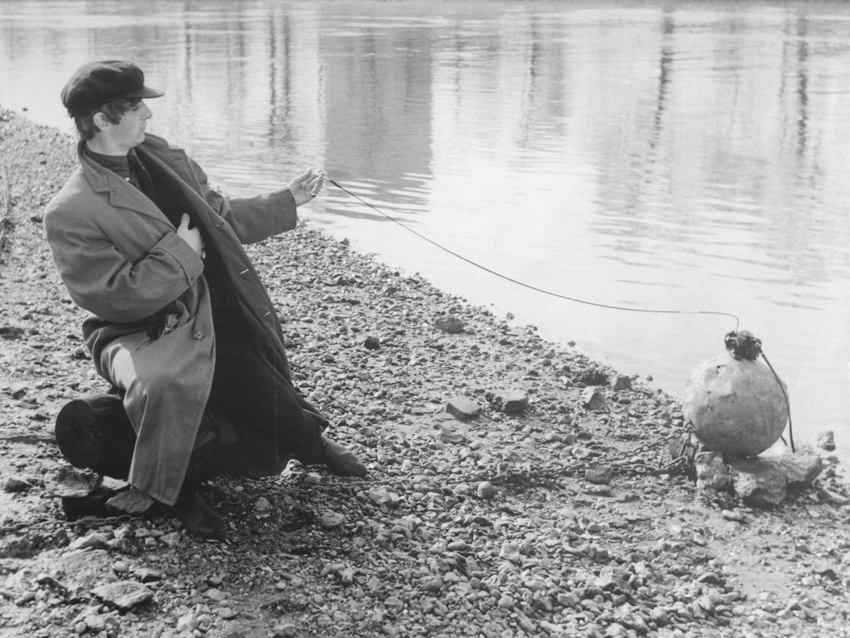
Giles Martin on remixing The Beatles' A Hard Day's Night
Did you consult with Paul or Ringo at any point in the project, or even your dad?
“With Paul and Ringo, I sent them things to get comments, and I bribed them, obviously. [Laughs] I was involved with something else with Paul anyway, so I would talk to him. I bump into Ringo, and I see my dad on weekends, so I’d talk to them about it. Richard Lester, I don’t really know him, but I want him to be happy. I have to be honest: I’m passing through this, or it’s passing through me. But I’m not the creator in any way. If I felt as though I was ruining somebody’s vision of what this had to be, I’d be very uncomfortable with that.”
Last question: Why was the name “The Beatles” never spoken in the film? Did Paul or Ringo or your dad ever tell you?
“Oh, I don’t know. I didn’t know it wasn’t.”
No, it’s never said once. You see the logo on Ringo’s drums, but nobody ever says, “The Beatles.”
“That’s interesting. Maybe they were thinking of changing their name. [Laughs] Maybe it was a case of – and this is me speculating – that it’s not really them. It’s four people playing how The Beatles would be, almost as a caricature. It’s a case of suspension of belief, maybe. I don’t really know – that’s interesting.”
For a list of theaters in the US that will be showing A Hard Day's Night on July 4, click here. To purchase the Criterion Collection Dual-Format Blu-ray and DVD Special Edition of the film, click here.
Joe is a freelance journalist who has, over the past few decades, interviewed hundreds of guitarists for Guitar World, Guitar Player, MusicRadar and Classic Rock. He is also a former editor of Guitar World, contributing writer for Guitar Aficionado and VP of A&R for Island Records. He’s an enthusiastic guitarist, but he’s nowhere near the likes of the people he interviews. Surprisingly, his skills are more suited to the drums. If you need a drummer for your Beatles tribute band, look him up.
